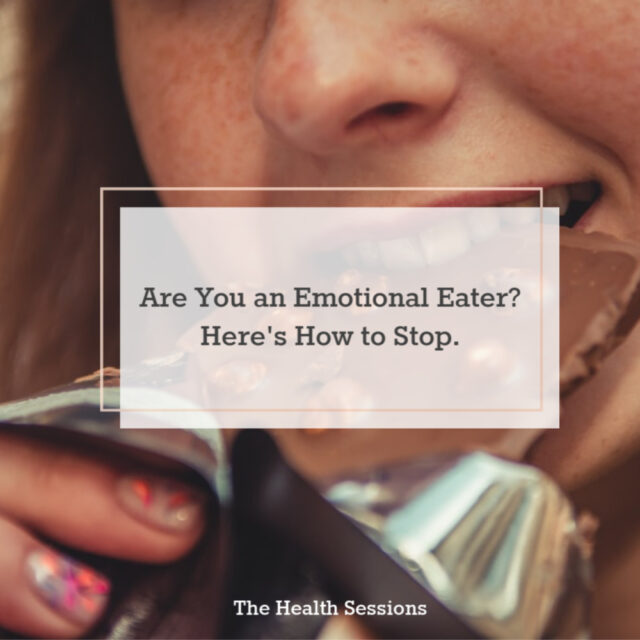14 Encouraging Quotes to Keep Hope Alive in Dark Times

This article is written by David Dack.
Those chocolate chips may seem delicious when you’re feeling down.
But the relief won’t last. Devoid of the ability to process your emotions, you may become more inclined to turn toward food to find release for your feelings.
In other words, you’re emotionally eating, and it’s bad for you. If you’re dealing with emotional eating right now, I want to let you know that regardless of how challenging and impossible it may seem, you can break out of this seemingly vicious cycle.
Here are my top tips on how to stop emotional eating.
Emotional eating refers to turning to food to feed emotions vs. your body. It happens when you reach for food in the absence of physical hunger as a means to soothe oneself and alleviate negative and unwanted emotions.
While it’s not bound to happen, eating this way results in overeating compulsively, or what’s known as bingeing. Emotional eating is a sneaky monster. It creeps on us, and before we can have a say, it already calls the shots, dictating when—and how much—we eat.
Even though many emotional eaters are driven by stress, stress isn’t the only culprit. Other emotions can be triggers too, such as sadness, depression, loneliness, anger, and even happiness.

Emotional eating is no more than a band-aid for emotional strife. Afterwards, the issue comes right back, often made worse by regret and guilt from the indulgences.
When you’re trapped in the emotional cycle trap, you’ll find it hard to care about the consequences nor weigh in the future ramifications of your behavior. In essence, you lose sight of the big picture. This eventually will lead to a host of problems, such as difficulty to lose weight, low self-confidence, bad food choices, etc.
So are you an emotional eater? Of course, no one is immune to emotional eating. We all tend to fall victim to it now and then since food plays have such a big impact on how we feel and the way we perceived the world. But if you engage in it more often than you should, then you likely have a bad relationship with food.
If you answer yes to more than a few of the following questions, then you’re likely engaging in emotional eating more than you think:

Trying to force your way out of the emotional eating trap using nothing but willpower doesn’t work. All it takes is a bad day at work—or a nasty fight with your significant other—and you’ll find yourself back to your old ways.
Here’s the good news, though. If you tend to fall victim to stressful eating, know that there are measures you can take to prevent yourself from reaching for the cookies to suppress negative feelings.
The first step toward breaking this cycle is to allow yourself to experience those emotions and accept them—regardless of how unpleasant or ugly they seem.
I get it. It’s much easier said than done. No one likes feeling depressed, rejected, or sad. But feeling dwelling on your mistakes won’t change anything. Instead, it might make things worse by forcing you to emotionally eat.
When you find yourself in a setting conducive to emotional eating, pause for a moment, and get a sense of the facts. If you can see through the feelings, you can start to work on the tendencies that follow.
To stop emotional eating in its tracks, you need to get to know the culprits behind it. After all, if you don’t address these deep root cases, you’re only going placing a band-aid on a severe wound. For example, it’s possible that certain work events and circumstances make you more likely to get the urge to overeat.
So how do you uncover these often unconscious triggers? Start journaling.
Keeping a food diary in which you keep track of your food intake and emotional states. The fact is, keeping a food/mood diary is one of the best ways to help you identify patterns behind your emotional eating.
As you keep track of your daily food intake, you’ll start to notice patterns emerge. This is what will help guide you to make better choices when dealing with your emotions without eating.
In the food journal, you’ll keep track of what you eat through the day alongside your emotional states and major events in your life. Your food diary could also reflect your day in general: what you did, your activities, your emotional states, and what you eat

Once you have identified your emotional eating suspects, brainstorm some healthy alternatives for the next time your emotions get out of control. You’ll need to come up with better and healthier ways to self soothe and release negative emotions if you’re serious about fixing your relationship with food for good.
Here’s the simple formula: When (negative feeling), I will (healthy behavior).
Here are a few examples to get you started:
Negative feeling:
Healthy behavior:

There you have it. The above guidelines should get you started on conquering your emotional eating issues.
Here is the simplified 3-step plan:
See, it’s actually just a matter of practice. The rest is just details.
Please feel free to leave your comments and questions below. I’d love to hear more about your story and what makes you tick. In the meantime, thank you for dropping by. Keep living healthy.
Author bio: David Dack is an established fitness blogger and running expert. When he’s not training for his next marathon, he’s doing research and trying to help as many people as possible to share his fitness philosophy. Check his blog Runners Blueprint for more info.
If you enjoyed reading this article, you might also like: